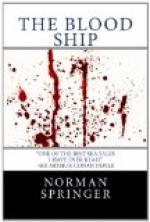The carousing gang downstairs was more than ever distasteful to me. I went into my own room and lay down upon the bed. The liquor that was in me made me a bit drowsy, and I rather relished the thought of a nap.
But I discovered I was likely to be cheated of even the nap by my next door neighbors. The walls in the Swede’s house were poor barriers to sounds, and lying there on the bed I suddenly found myself overhearing a considerable part of the conversation in the next room. Newman’s deep voice was a mere rumble, a menacing rumble, with the words undistinguishable, but the beggar’s disagreeable whine carried through the partition so distinctly I could not help overhearing nearly every word he said. I didn’t try to eavesdrop; at the time Beasley’s words had little interest or meaning for me. But afterwards, on the ship, I had reason to ponder over what he said.
The burden of his speech was to the effect that somebody referred to as “he” was to blame. Aye, trust a rat of that caliber to set up that wail. For some time that was all I got from the words that came through the wall. I wasn’t trying to listen; I was drowsing, and paying very little attention.
But gradually Beasley’s whine grew louder and more distinct. I suppose the whisky was oiling his tongue. Once he cried out sharply, “For God’s sake, don’t look at me like that! I’m telling the truth, I swear I am!” The scrape of a chair followed this outburst, and when the whine began again it was closer to the wall, and more distinct than ever.
“I didn’t want to, but he made me. I had to look out for myself, hadn’t I? I had to do what he said. He had this paper of mine—he knew they were forgeries—I had to do what he said. But, my God, I didn’t know what he was planning—I swear I didn’t!”
Newman’s rumble broke in, and then the voluble, reedy voice continued, “But he was wild when he came home and found you and Mary so thick, and everybody just waiting for the announcement that it was a match. Why, he had the whole thing planned, the very day he arrived. I know he had, because he came to me, in the tavern, and told me I was to drop hints here and there through the village that you and Beulah Twigg had been seen together in Boston. I didn’t want to, but I had to obey him. Why, those checks—he could have put me in prison. My father would not have helped me. You remember my father—he was ready to throw me out anyway. He never could make allowances for a young fellow’s fun.
“He had others dropping hints around. Trust him to handle a job like that. He was your friend, and Mary’s friend—your very best friend, and all the time the tongues were wagging behind your back. Why, it was the talk of the town. You and Beulah Twigg, together in Boston; you and Beulah together at sea; you and Beulah—well, you know what a story they would make of it in a little town like Freeport. Mary must have heard the gossip about you; the women would tell her.




